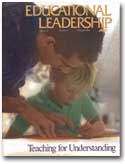The New York Times announced that the Queen of England has stepped down from her throne and at the same time has dis-established the House of Windsor. The English monarchy is at an end.
The New England Journal of Medicine has published a study in which two groups of elementary school students were randomly assigned to two after-school programs: indoor gymnasium sports and personal computer work. Twice as many students in the first group contracted colds. The speculation is that after-school athletics may be injurious to one's health.
Wearing the hat of the disciplinarian, we can consider our first example as drawn from history or social studies and the second from biology or general science. Either account could serve as the point of departure of a set of lessons in appropriate high school classes. If reworded, they could be used with students at virtually any grade level. The first account—which could also refer to the death of a president or the deposing of any kind of leader—raises questions such as “What makes a boss a boss?” or “Why do all civilizations have hierarchies of authority?” The second account could be reformulated to describe any source of disease and to encourage reflections about what keeps us healthy, what is illness, and how to prevent it.
Here we attempt to place current efforts at teaching for understanding into a sharper perspective by considering the way in which this performance view plays out in different disciplines.
Understanding Within the Disciplines
The four-part framework developed by our Teaching for Understanding group is deliberately broad enough to cover the range of disciplines. (See “Putting Understanding Up Front” p. 4.) At the same time, however, all disciplines are not equal. In fact, distinct disciplines have developed over the ages precisely because they allow scholars and students to take different kinds of perspectives and actions in order to elucidate specific kinds of phenomena.
Consider our opening examples. In each case, we are dealing with a central concept: (1) injury to the body politic, and (2) injury to the physical body. Analysis and evaluation of concepts are legitimate tacks in both examples.
In other respects, however, the disciplinary terrains prove quite different. For instance, to gain relevant expertise in our abdication situation, students might draw on knowledge about British history and its current form of government, as well as the legal and symbolic implications of the abolition of monarchy. Students can “perform” their understandings in any number of ways—ranging from a comparison of the situation at the time of the beheading of King Charles I or the abdication of Edward VIII, to a hypothetical argument in a local pub about the abolition, to the creation of a diagram of the new governmental organization.
By their very nature, historical phenomena are unique. One can compare abdications and beheadings, but they are never the same. When dealing with individual personalities, varying contexts, and dynamic events, the complexity of the events can never be mastered nor the consequences predicted. Finally, events in this sphere take on symbolic as well as literal/legal importance. While in practice the British monarchy has little authority, in actuality it assumes significant symbolic power. A disciplinary understanding of the possible impacts of dis-establishment on British public life is grounded in these specific features of historical events.
In contrast to the historical example, the realm of health and illness, at least in principle, should be open to explanation and prediction. This realm lends itself to the development of models of what causes illness and the testing of the models through experimentation. A well-founded model is able to predict results across diverse populations. Moreover, explicit methodologies exist for mounting experiments and for analyzing data, ones that can be used by anyone schooled in science. Consequently, in the case of colds among athletes, students might gain relevant expertise by drawing on knowledge about health and illness, including bacterial and viral theories of infection, as well as understandings of the nature of scientific hypotheses, experimental designs, and inferences from data. To demonstrate their understanding, students might conduct similar experiments, perform retrospective examinations of the incidence and plausible causes of their own recent colds, or construct rival models of disease.
From Common Sense to Interdisciplinary Study
So far, we have dealt with might be called “normal” disciplinary work at the secondary level. We have assumed that there are classes that deal with historical-political studies, those that deal with scientific inquiry, and a set of roles and performances appropriate to students in those respective classes.
Common sense. Novices fruitfully consider generative questions by relying on their intuitive theories of the world—their natural theories of mind, matter, and life (Gardner 1991). Students as young as 5 or 6 can consider what it means to be a leader and then voluntarily or involuntarily to renounce one's position as boss. They can consider what would happen if the teacher or the boss stepped down and no one took his or her place. Adults can ask young students to draw on their own theories of power—the person who is strongest, loudest, bossiest, or the person chosen by someone even more powerful—to debate these issues.These same students can also be guided into discussions of health. All youngsters are interested in their bodies—what makes them strong, weak, sick, or healthy. They can apply their own naive theories—you are sick because you were bad, because you sat near someone who was sick, because you did not wash your hands—to new events, including the appearance of a new sickness or a new cure. Note that in these cases, it is not important that students espouse the “right theories,” but that they draw fully on their own ideas in an effort to make sense—to perform their understandings—of intriguing phenomena.
Protodisciplinary knowledge. Even in the absence of formal disciplinary study, students in our culture pick up certain moves that are made by systematic thinkers—through, for example, the media, debates among peers, and partial understanding of texts. Long before they have heard of college catalogues, and despite the movie JFK, students in the late primary or early middle grades begin to appreciate the difference between a historical account (what actually happened) and a literary account (a description invented for aesthetic purposes). By the same token, they begin to distinguish claims that are based on conviction or prejudice from claims based on empirical evidence, which itself can be confirmed or questioned.At this stage, youngsters can proceed in a more sophisticated way. They can read historical or scientific accounts, summarize them, conduct further research, and debate the validity of various claims. And they can engage in projects—such as holding a mock trial or conducting a survey—that introduce them naturally to the tools of the disciplines.
Disciplinary knowledge. By late middle school and thereafter, students do most work under the rubric of classical disciplines, such as history, literature, and the sciences. Because it is fashionable to look askance at the disciplines, we feel it is important to make two points. First, disciplines are not the same as subjects. Disciplines constitute the most sophisticated ways yet developed for thinking about and investigating issues that have long fascinated and perplexed thoughtful individuals; subject matters are devices for organizing schedules and catalogues. Second, disciplines represent the principal ways in which individuals transcend ignorance. While disciplines can blind or sway, they become, when used relevantly, our keenest lenses on the world.When well taught, students are introduced to the disciplines in several ways. First, they observe teachers or experts who embody the practices of the disciplines. Second, students behold and create exhibitions that capture the accumulated wisdom of the discipline. Third, students encounter the concepts, theories, and methods that disciplinarians have evolved over the years, and receive ample opportunities to put them into practice. Only through such sustained work—work that is “disciplined” in both senses of the term—may students acquire the expertise that we have described.
Beyond disciplinary knowledge. Even as it is now fashionable to critique the disciplines, it is trendy to advocate “interdisciplinary” work. At its best, interdisciplinary work is indeed vital and impressive. However, such work can only be legitimately attempted if one has already mastered at least portions of the specific disciplines. Unfortunately, much of what is termed “interdisciplinary” work is actually predisciplinary work—that is, work based on common sense, not on the mastery and integration of a number of component disciplines.
Those who have slogged through a number of specific disciplines are in a privileged position. They can conduct multidisciplinary work in which, for example, they look at the abdication of King Edward VIII as portrayed in art, literature, history, and philosophy. They can undertake interdisciplinary work, in which they consider the concept of health in terms of both medicine and individual psychology, and then synthesize these perspectives in coming up with a more general account. They can carry on metadisciplinary work, in which they compare the practices of particular disciplines, as we have done earlier in this article. And they can engage in transdisciplinary work, where they examine a concept, like “body,” as it appears in political and in physical discourse.
Disciplinary Powers and Limitations
In our view, the disciplines are the most useful means for illuminating those generative issues that have perennially engaged the curiosity of thoughtful human beings. What in the past was approached first through common sense, and later through art, mythology, and religion, can now be approached as well through systematic studies, such as political science or medical experimentation.
Far from being ends in themselves, the disciplines are means for answering generative “essential” questions. Indeed, armed with the disciplines and with the possibility of interdisciplinary work, individuals are in the best position to revisit these essential questions and to arrive at their own, often deeply personal answers.
Disciplines are differently transfigured, depending on purpose and developmental levels. For elementary education, it may be enough to separate out the arts and humanities, on the one hand, and the experimental sciences on the other. At the high school level, a distinction into three or four disciplinary terrains probably suffices (Sizer 1992). And at the university level, a quite fine differentiation and articulation among disciplines is appropriate.
All disciplinary boundaries are tentative. Disciplines have not been, and probably never will be, marked in stone. Rather, they develop out of specific conditions, and as these conditions change, boundaries are redrawn. Moreover, even within the most established disciplines, serious disagreements exist with respect to content, methods, and scope. The dynamism of disciplines reflects the always growing, ever-changing nature of knowledge.
Assessment Within and Across the Disciplines
Some aspects of assessment are appropriate for all disciplines, while others turn out to be far more specific to particular disciplinary practices. At the generic level, each discipline features certain characteristic roles—the historical analyst, the designer of experiments—and certain characteristic performances or exhibitions—a historical account, an experimental write-up. Students need to be immersed in instances of these roles and performances of understanding, particularly as they are practiced by proficient individuals.
But even the best instances do not suffice. It does not benefit the rookie pianist to hear Arthur Rubinstein or the novice tennis player only to witness Martina Navratilova. Rather, students must encounter individual benchmarks on the trail from novice to expert, as well as road maps of how to get from one milestone to the next. Given these landmarks, along with ample opportunity to perform their understanding with appropriate feedback, most individuals should be able to steadily enhance their competence in any discipline.
Of course, disciplines lend themselves to different kinds of roles and performances. To read texts critically, in the manner of a historian, is a quite different matter than to design a crucial experiment and analyze data relevant to competing models of an infectious process. Different disciplines call on different analytic styles, approaches to problem solving and findings, temperaments, and intelligences. Therefore, a keen assessment must be alert to these disciplinary differences. By the same token, an effective teacher should help youngsters to appreciate that what counts as cause and effect, data and explanation, use of language and argument, varies across the disciplines.
From Disciplinary to Personal Knowledge
All individuals the world over, not just knowledgeable people, ask generative questions. Children do not ask about the meaning of life and death or good and bad merely because others talk about these issues. Rather, these questions arise spontaneously, prompting children to pose them in their own way and to come up with imaginative answers. The disciplines, individually and jointly, offer the best current efforts to approach, and to supply, provisional answers for these enduring questions. As we saw in our two simple examples (about abdication and illness), just as questions come from different points and lead to different kinds of answers, the disciplines themselves have disparate roots and lead, by varying routes, to different kinds of accounts.
Drawing on the disciplines, we should find it possible to mount increasingly comprehensive approaches to generative questions—approaches that are appropriate to particular contexts and populations. In the end, however, we need to keep in mind that the disciplines remain but the means for tackling these questions. The most important answers are those that individuals ultimately craft for themselves, based on their disciplinary understandings, their personal experiences, and their own feelings and values.





